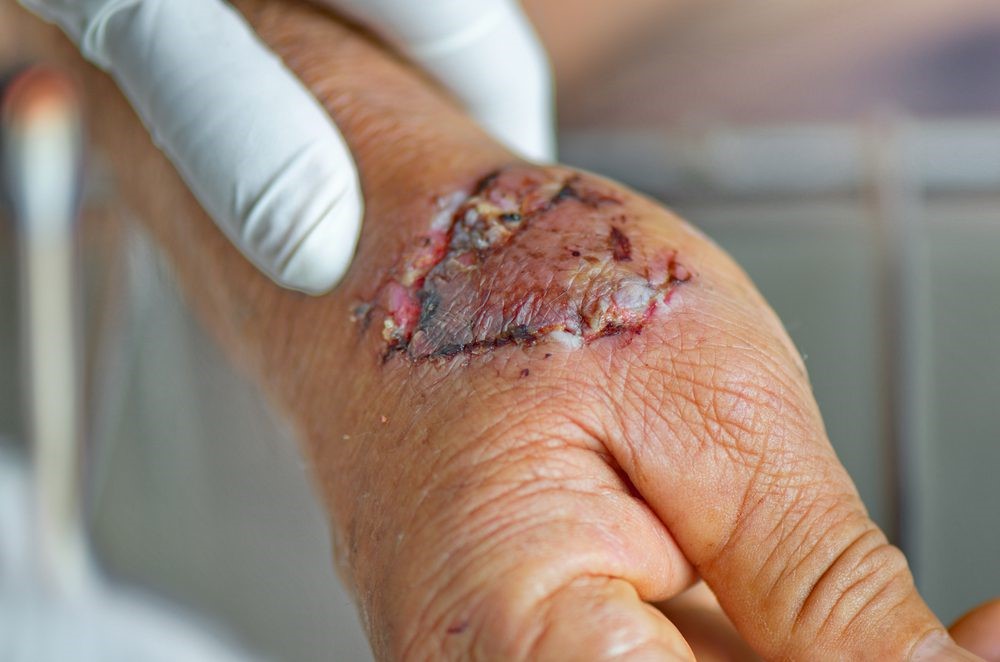New Jersey Dog Bite Lawyers
Upholding the Laws That Protect Citizens from Dog Bites & Dog Attacks Throughout New Jersey
Every year, over 4.5 million people in the U.S. are bitten by dogs, with more than 800,000 requiring medical attention, according to the CDC. Children are especially vulnerable, making up at least half of these victims and often suffering severe injuries.
If you or your child has been bitten by a dog in New Jersey, it’s crucial to know your rights and how to seek compensation for medical treatment, lost wages, and other damages. Dog bite injuries can result in significant expenses and emotional trauma. Legal action can provide financial recovery to help you cope with the aftermath. At Gay Chacker & Ginsburg, our expert dog bite attorneys specialize in maximizing recovery for victims. Contact us at (215) 220-6748 for a free case review.
Common Types of Dog Bites
A study on emergency department visits highlighted common dog bite locations: face, hands, extremities, buttocks, and genitals. Hand injuries frequently lead to infections, necessitating further hospital visits.
The severity of a dog bite can vary depending on the size and breed of the dog, as well as the location and depth of the wound. Some common types of dog bites include:
- Puncture wounds: These can be deep and difficult to clean, increasing the risk of infection.
- Lacerations: These are cuts or tears in the skin that may require stitches or other medical treatment.
- Crush injuries: These occur when a powerful bite from a large or strong breed crushes bones and tissues, causing severe damage.
- Nerve damage: If a dog’s teeth damage nerves in their victim’s face or extremities, it can result in long-term pain and mobility
For legal support in New Jersey, trust Gay Chacker & Ginsburg to protect your rights and help you secure the compensation you deserve.
 Dog Bite Injuries: Physical, Emotional, and Psychological
Dog Bite Injuries: Physical, Emotional, and Psychological
A dog attack can result in various injuries, including:
- Physical wounds like lacerations, punctures, and damaged tissues, which may lead to infections.
- Bone injuries such as fractures and bruises.
Victims in New Jersey should seek immediate medical attention for any dog bite. Treatment might include stitches, surgery, and infection prevention measures. A doctor may also administer a tetanus shot and prescribe painkillers or antibiotics. Unfortunately, some dog bite injuries can leave permanent scars, necessitating plastic surgery for additional repairs.
Infections are a major concern with dog bites, potentially escalating to life-threatening conditions like MRSA or tetanus. Unvaccinated dogs may also transmit rabies through bites.
Beyond physical injuries, dog attacks can leave emotional and psychological scars. Victims may experience:
- Fear of dogs
- Nightmares
- Appetite changes
- Sleep disturbances
- New phobias
- Personality shifts
- Emotional outbursts
Post-traumatic stress disorder (PTSD) is common and often requires psychological therapy.
Types of Damages in a Dog Bite Case
In New Jersey, dog bite victims might be entitled to compensation based on the severity of their injuries and the dog’s history. Potential recompense includes:
- Medical expenses (past and future)
- Lost wages due to recovery time
- Compensation for any permanent disability
Victims may face significant medical and recovery-related expenses. Since dog owners can be held liable, it’s advisable for victims to seek legal advice. A New Jersey dog attack lawyer can help understand rights and explore pathways for financial compensation.
New Jersey Dog Bite Laws
In New Jersey, dog owners are strictly liable for bite injuries. Whether a dog in New Jersey attacks someone on public property or in its own home or yard, the dog’s owner is responsible. It is not necessary to prove that the dog had any history of vicious tendencies. The only exception to this law is when a victim was unlawfully trespassing on the dog owner’s property with the intent to commit a crime when the attack occurred.
Owner Liability for a Dog Bite Injury in NJ
The owner of a dog that bites a person in a public place, or lawfully in a private place, is strictly liable for resulting damages suffered by the victim. It doesn’t matter whether the dog previously acted viciously, or the owner knew about its viciousness.
New Jersey Statute of Limitations for Dog Bite Injuries
The time limit to file a New Jersey personal injury claim (including a dog bite claim) is two years from the date the injury occurred. For minors, the two-year period begins when the child turns 18.
Frequently Asked Questions
Below are answers to some common questions about filing a claim and seeking compensation for a dog bite injury in New Jersey.
I GOT BITTEN BY A DOG IN NEW JERSEY. WHAT SHOULD I DO?
The Cleveland Clinic recommends these steps:
- Clean the injury with mild soap and warm water for five to 10 minutes. Use a clean cloth to slow bleeding.
- Apply antibiotic cream, wrap in a sterile bandage, and seek medical attention.
- Monitor for infection signs like swelling, redness, fever, and increased pain.
For severe bites, call 9-1-1 immediately. After emergency treatment and reporting the bite to local authorities, consult with an experienced New Jersey attorney about filing an injury claim.
HOW DO I FILE A DOG BITE CLAIM IN NEW JERSEY?
After receiving medical care, report the incident to local authorities. Consult a New Jersey attorney to guide you through the process of filing a claim to seek compensation for your injuries.
WHO IS LIABLE FOR MY INJURIES?
In New Jersey, the owner of a dog that bites a person is liable for the victim’s resulting damages, regardless of the dog’s past behavior or the owner’s knowledge of potential aggression. The only exception is if the bite victim was unlawfully trespassing with criminal intent when the dog attacked.
I HAVE MEDICAL BILLS, BUT I DON’T WANT TO SUE THE DOG OWNER. WHAT CAN I DO?
In New Jersey, you can seek compensation from the dog owner’s insurance company without directly suing them. Most policies cover dog bite injuries, but some may exclude specific breeds or only cover the first incident. Check your policy for specifics, especially regarding off-property bites.
WHAT HAPPENS TO A DANGEROUS DOG IN NEW JERSEY?
In New Jersey, if a dog is deemed dangerous, the following people can file a complaint:
- The person attacked by the dog,
- Someone acting on behalf of the attacked individual,
- An owner of a domestic animal killed or injured by the dog,
- Law enforcement officers or animal control officers.
If the court finds the dog dangerous, the owner must comply with strict regulations, including confinement in a secure enclosure or a muzzle and leash requirement when off-property. The dog cannot be sold or transferred except for euthanasia or relocation to an approved facility.
DOES A DOG THAT BITES OR ATTACKS SOMEONE HAS TO BE CONTAINED IN NEW JERSEY?
An animal control officer may seize a dog when there is reasonable cause to believe that it:
- Attacked a person and caused serious physical injury or death,
- Caused a physical injury to a person during an unprovoked attack and poses a serious threat of harm to individuals or other domestic animals,
- Engaged in dogfighting activities, or
- Has been trained or encouraged to attack people or domestic animals unprovoked
The dog will be impounded until there is a decision as to whether the dog is vicious or potentially dangerous.
WHAT HAPPENS TO VICIOUS OR POTENTIALLY DANGEROUS DOGS IN NEW JERSEY?
A dog is declared vicious if there is strong evidence that the dog killed a person or caused serious bodily injury or has engaged in dogfighting activities. An exception is if the dog was provoked. If the court declares a dog to be vicious, and no appeal is made, the dog will be humanely euthanized.
A dog is considered potentially dangerous if there is strong evidence that the dog:
- Physically hurt a person during an unprovoked attack and poses a threat to people,
- Severely injured or killed another domestic animal and poses a threat, or
- Has been trained or somehow encouraged to attack people or other domestic animals without provocation.
A dog is not considered potentially dangerous for causing bodily injury to a person if the dog was provoked, or for severely injuring or killing a domestic animal if that animal was the aggressor.
If the municipal court declares the dog to be potentially dangerous, it will require the owner to apply for a special license, registration number, and proper identification. The owner must also clearly display a sign warning that a potentially dangerous dog is on the premises. There must also be an enclosure for the dog that follows the specific guidelines under state law. The owner may need to also maintain liability insurance on a potentially dangerous dog.
Legal Assistance for Your Dog Attack Claim in New Jersey
At Gay Chacker & Ginsburg, our dog attack attorneys have decades of experience defending the rights of those injured by dog attacks. We specialize in overcoming defense arguments to ensure victims receive the compensation they deserve.
If you or your child was bitten by a dog in New Jersey, seek medical attention immediately. Our skilled dog bite lawyers will then guide you through your legal options, aiming to recover your losses, such as medical bills, future treatments, lost wages, and pain and suffering.
Call us at (215) 220-6748 or [fill out our online form](https://gayandchacker.com/contact/) for a free, no-obligation case review. We charge no legal fees unless we secure compensation for you. Contact us to learn how we can assist with your dog bite case.








